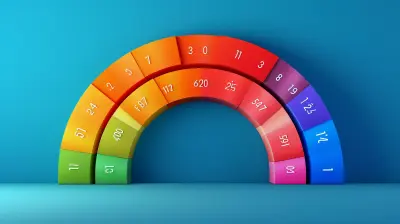Essential Tips on How to Stick to Your Budget
12 July 2025
Sticking to a budget might sound like one of those things that are easier said than done. You create a plan, set your spending limits, and promise yourself you'll stay on track. But then life happens—unexpected expenses, tempting sales, or simply forgetting to check your balance before making a purchase. Before you know it, your budget is out the window.
But here's the truth—sticking to your budget doesn't have to feel like a punishment. It’s not about depriving yourself; it's about gaining control, reducing stress, and working toward financial freedom. If you're ready to make budgeting a habit (and actually stick to it), here are some essential tips to keep you on track. 
1. Set Clear Financial Goals
Why do you want to budget? If you’re not sure, chances are you won’t stay committed. Are you saving for a house, clearing debt, or just trying to stop living paycheck to paycheck? Having a clear purpose will keep you motivated when temptation strikes.Think of your budget as a roadmap. Without a destination, it’s easy to get lost. But when you know where you’re headed, it’s easier to make smart financial decisions that align with your goals. 
2. Track Every Penny You Spend
Most people underestimate how much they actually spend. That $5 coffee every morning? It adds up. The occasional impulse buy? It matters. The secret to mastering your budget is knowing exactly where your money is going.Start by tracking your expenses for a month. You can use a budgeting app, write it down in a notebook, or even use a simple spreadsheet. Once you see where your money is going, it’s easier to identify spending habits that need adjusting. 
3. Create a Realistic Budget
A budget that looks good on paper but isn’t practical in real life will never work. If you’re too strict with yourself, you’ll feel frustrated and eventually give up. Instead, set a budget that aligns with your lifestyle.Here's a simple approach:
- 50% for necessities (rent, utilities, groceries, transportation)
- 30% for wants (dining out, entertainment, hobbies)
- 20% for savings & debt repayment
This method gives you structure while still allowing flexibility. 
4. Automate Your Savings
Saving money shouldn’t be an afterthought. If you wait until the end of the month to save whatever’s left, chances are, there won’t be anything left. Instead, pay yourself first.Set up an automatic transfer to your savings account as soon as you get paid. This way, you prioritize saving instead of treating it as an optional expense. Even if it’s a small amount, consistency is key.
5. Use Cash for Discretionary Spending
Ever noticed how easy it is to swipe your card and overspend? That’s because spending digital money doesn’t feel as "real" as handing over actual cash. A simple trick to control your discretionary spending is to use cash.Take out a set amount of cash for things like dining out, shopping, or entertainment. Once the cash is gone, you stop spending. This method—often called the cash envelope system—helps keep overspending in check.
6. Identify and Cut Unnecessary Expenses
Small, recurring expenses can drain your budget without you even realizing it. Look at your subscriptions, memberships, and daily spending habits. Do you really need five different streaming services? Could you make coffee at home instead of buying it every day?Cutting these unnecessary costs doesn't mean you have to deprive yourself—it just means being mindful about where your money is going. These small changes can add up to significant savings over time.
7. Plan for Unexpected Expenses
Life is unpredictable. Car repairs, medical bills, or home emergencies always seem to pop up at the worst times. If you don’t account for unexpected costs, you’ll end up blowing your budget.The solution? Build an emergency fund. Aim to save at least 3-6 months’ worth of expenses in a separate savings account. Even if you start small, having a cushion will prevent financial stress when the unexpected happens.
8. Avoid Impulse Purchases
Impulse buying is one of the biggest budget killers. It’s easy to convince yourself that you “deserve” that splurge, but these small, unplanned purchases can derail your financial goals.A simple trick? Use the 24-hour rule. If you see something you want, wait a full day before buying it. More often than not, the excitement wears off, and you realize you don’t actually need it.
9. Find Ways to Increase Your Income
Cutting expenses is one part of budgeting, but increasing your income is just as important. If you’re struggling to make ends meet, consider looking for ways to earn extra cash—freelancing, selling things you don’t need, or picking up a side hustle.Even an extra $100 per month can make a huge difference in paying off debt or boosting your savings. The key is to direct that extra income toward your financial goals instead of increasing your spending.
10. Hold Yourself Accountable
Budgeting is easy to start but hard to maintain if no one is keeping you accountable. Share your financial goals with a trusted friend, partner, or family member. They can help keep you in check and encourage you to stick to your budget.Additionally, review your budget regularly. Take time at the end of each month to see what worked, what didn’t, and make adjustments as needed.
11. Reward Yourself (Without Breaking the Budget)
Budgeting doesn’t mean you can’t have fun. If you’re too restrictive, you’ll end up frustrated and give up. Instead, build small rewards into your budget.Did you stick to your budget all month? Treat yourself to a nice meal or a small shopping spree—within reasonable limits. This keeps you motivated and makes budgeting feel more sustainable.
12. Remember, Progress Over Perfection
You won’t get budgeting 100% right all the time, and that’s okay. Life happens. Unexpected costs will arise, and sometimes, you might overspend. The key is not to let one bad decision throw you off track completely.Progress matters more than perfection. If you slip up, don’t give up—just adjust and move forward. Each month is a new opportunity to improve.
Final Thoughts
Sticking to a budget isn’t about restricting yourself—it’s about gaining financial control and peace of mind. With a little discipline, small habit changes, and a clear financial goal, you can take charge of your money instead of wondering where it went.Remember, every financial success story starts with a budget. Stick to yours, and watch your financial future transform.
all images in this post were generated using AI tools
Category:
Budgeting TipsAuthor:

Angelica Montgomery
Discussion
rate this article
1 comments
Gwen Cook
This article provides practical and actionable advice on budgeting. I particularly appreciate the emphasis on setting realistic goals and tracking expenses closely. Implementing these tips can significantly enhance financial discipline and help readers achieve their financial objectives more effectively. A must-read for anyone looking to improve their budgeting skills!
July 28, 2025 at 12:15 PM

Angelica Montgomery
Thank you for your thoughtful feedback! I'm glad you found the advice helpful for improving budgeting skills and enhancing financial discipline. Your support means a lot!


